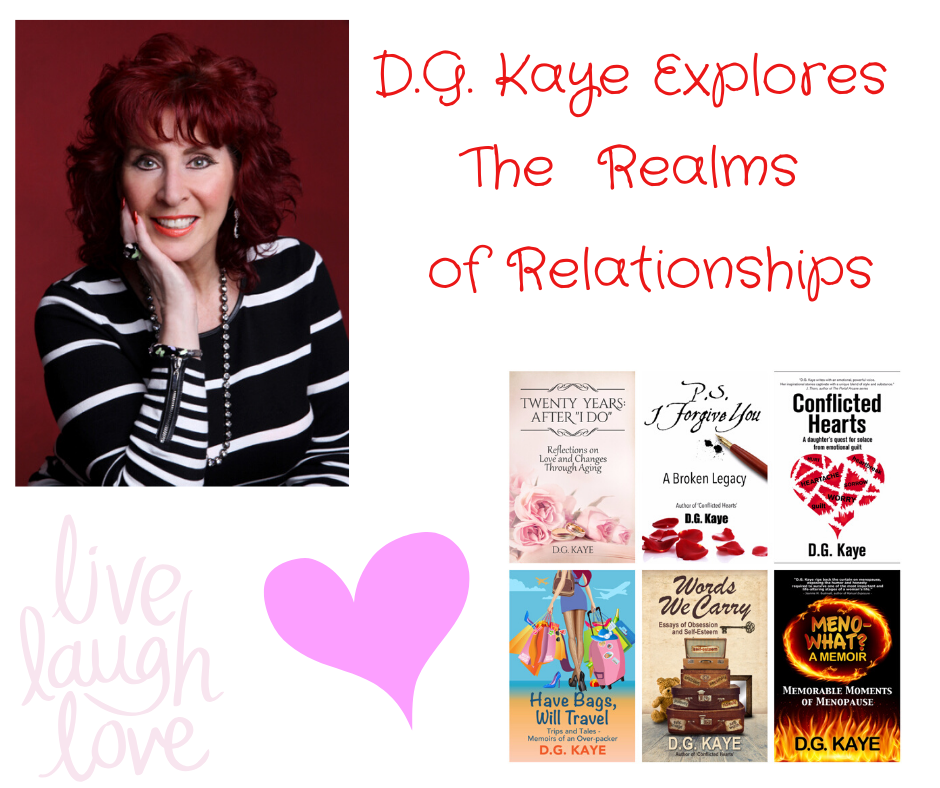Welcome to the first edition for 2021 of my monthly column – Realms of Relationship I write for Sally Cronin’s Smorgasbord Blog Magazine. In this Part 1 of 2, I’m discussing the importance of vetting online communications – emails, social media, etc – for scammers and trolls. In part 2 this month, I’ll be delving further into what you need to know when it comes to vetting potential online relationships of the heart.
Smorgasbord Blog Magazine – D. G. Kaye Explores the Realms of Relationships – January 2021 – Online Connections–Vetting on the Internet, Email and Social Media for Scammers and Trolls
Happy New Year and welcome back to a new year of Realms of Relationships. This is my corner at Smorgasbord Blog Magazine where Sally generously, gives me a featured spot here to share some nuggets of experience on various aspects of communication and relationships we encounter and form through life, where I talk about how I analyze and deal with same issues.

Much of the world has at least somewhat of a digital existence since the advent of the internet became an appendage part of our lives these past few decades. Internet has become a whole new entity of itself and some who aren’t so internet savvy have to be extra diligent about who they allow into their circles – even more so – into their lives, digitally.
Now, we all know the many pros about living digitally, but do we know how to recognize the cons?
Social media, email and online dating apps can become threatening when allowing or inviting the wrong type of people into our circles. It’s essential we verify who we are speaking with on the other side of the internet before we allow them into our business.
On the pro side, social media and group apps are a good thing to keep us engaged, and a good means to interact with our peers and family. We can Zoom with friends, family, and for meetings, which of course has been a lifeline for many during this Coronavirus time.
We can instant message our friends and family through apps and texts. And we can make connections with like-minded people globally. And of course, there are numerous apps online for dating. But I caution to be diligent on those apps, and I’ll get to that next issue.
On the con side, in order to make healthy and honest connections in this era of trolls and scammers, we should all be doing our due diligence verifying the people we allow in our circles, making sure they are authentic. Before we make new bonds or meet up with people we’ve met on apps, it’s essential that we do a little background checking. Just as it’s equally important to verify the true source of an email before allowing ourselves to be scammed. And these topics are what I’m going to cover here today.
***

Let’s begin with scam emails and how to detect them – what we need to look for when siphoning out a suspicious email. For example, I’ll share about some usual scammy emails I have personally received over time – scam emails from my bank, my government, Amazon, and Paypal and how I deal with them.
In the past few weeks alone, I’ve been inundated with emails from Amazon, informing me that my account is under investigation and has been closed due to suspicious activity, or requires my attention. The messages all ‘conveniently’ offer me a link so I can log in to my account and check what the ensuing problem is. DON’T! Do not click on that link! In fact, when you receive any kind of such emails NEVER EVER click on the supplied link in the email to sign into your account to investigate. NEVER! This is how the hackers get into your account, you are opening the door for them. Their intent with these emails are , they are hoping you do exactly that, open it!
I’m beyond recognizing these scams because they are so frequent. I just auto delete and don’t even bother going over to Amazon to check anything because I know the ruse. But for those of you who get startled and alarmed by such scary information and feel the need to verify, just GO directly to Amazon URL and log in to your account DIRECTLY FROM AMAZON. You are going to the source direct. If there is any problem with your account, Amazon will be only too happy to leave a notification on your account.
How to recognize scam mail –a huge tell of a scammy email is to look directly within the URL address from the sender. Any reputable company sending email will have no extra gobbledygook attached to the sender name. When you receive email from Amazon it will say something like -“Amazon dot com@support or something of its ilk, but it WILL NOT HAVE any other tails attached to the URL, such as random letters and numbers or names – like this: –Please continue reading at Sally’s Smorgasbord.
©DGKaye2021



So glad you posted this, Deb. I am constantly surprised how many people DON’T know how to vet email. Husby often brings one to me to check. Sure, it takes longer but it’s about safety!
Sharing…
LikeLike
Absolutely it’s about safety – invisible threats online to suck in the vulnerable. Thanks Jacqui 🙂
LikeLike
Just a quick comment here before I head over to Sally’s. Your information about scam emails is perfect. I’ve seen quite a few from Amazon, PayPal, etc, too, Debby, and each one makes me pause for an instant, then my inner skeptic takes over. Checking the url closely as you say reveals the scam, especially since most are riddled with misspelled words, a sign of foreign scam and lack of English.
We had a scam incident at my university and I almost fell for it (involved gift cards). It looked to be from our boss but the behavior of his note did not match what I knew about him. The URL looked strange and I forwarded to our IT dept. Two professors fell for it and paid a price. Even scams from emails posing as co-workers or friends can get by us, so be sure to be diligent.
LikeLike
Thanks for reading and commenting Terri. And thanks for sharing your experience as that was just one more deceiving method – sending emails to look like they’re from someone we know. Always look for the signs! ❤
LikeLike
Hi Debbie, I am sharing part of my comment here that I shared on Sally’s page. An excellent post!
This is excellent, comprehensive information, on important topics. I realize I am not internet savvy about who I allow into my digital space. I go by the “hope for the best” rule. I am also hoping my real life instincts help somewhat online.
A great visual “…you are opening the door for them.” Your words “gobbledygook” and “wonky” make me smile. Good descriptions. Re: social media – “do I want to them privy to the posts I make on my personal page” resonates with me. I did put together a Page specifically for my webite, although, I did not continue using it. You and I are on the same page about Maya Angelou’s quote, Debbie. Thank you for sharing a great post. I look forward to Part 2.
LikeLike
Thanks so much for reading Erica, and for hopping over to read the rest. Your comment about ‘hoping for the best’ is a bit scary my friend. Sadly, we must learn how to recognize the most blatant of scams and not keep hoping, because there are just too many of these cyber criminals to keep up with. I’m glad you found my explanation comprehensive. ❤
LikeLike
Hi again, Debbie, I am very careful with financial, household and personal information. You have brought into my radar the social media sites such as Instagram and Twitter. I screen with FB. I look forward to reading your Part 2.
LikeLike
Thanks again Erica. I’m happy to hear you are diligent and Part 2 is coming soon! ❤
LikeLike
I am happy to hear you are diligent Erica. Trolls are everywhere, we must learn how to discern them. Part 2 coming soon! ❤
LikeLike
So many pitfalls to negotiate. Sad to say that scammers are rife. x
LikeLike
A sad truth Stevie xx
LikeLike
Thanks for boosting the post Debby, such an important message.. great job thank you..♥
LikeLike
My absolute pleasure Sal. Thanks again for the platform ❤
LikeLike
lots of good advice here; I am surprised that many scammers have not gotten better at how they try and trick people. the same methods used years ago are still in place. I guess that’s good for the non-scammers, as we start to better recognize the scams…
LikeLike
Thanks Jim. And ssshhhhh, don’t give them any ideas LOL 🙂
LikeLike
Thanks for the warning, Debs. In the early days….I became entangled (oo duckie…) with an oil worker and a Sheik (come with me to the casbah), not to mention a US military man who, of course, was serving in Afghanistan, and was lonely.Despite telling all three I was ‘ancient’ and married they still sent me ‘notes’ on Twitter. All were polite, but the army man – despite all – suggsted that “somehow or other”…perhaps I could leave my husband and join him in the States! (I couldn’t believe my perfume was that strong…) The Sheik, who was into Falconry even offered to show me and my family around his country. (Word reached Seumas’ ears and he warned me the Sheik wasn ‘t kosher…I kid you not.) Nowadays, I’m more street-wise. Take care. Hugs xx
LikeLike
Omg Joy, that is just hysterical – if it weren’t almost scary! What is it with these military men? Between us and Sally and a few others I know of, we are inundated with affections from the military? But seriously, what you just wrote here has the makings for a hilarious book! Food for thought? Hugs woman! oxoxo
LikeLike
At least weekly I get something scary with an official-looking logo like Chase Bank, for example. Scammers are terrible at punctuation, spelling, and subject-verb agreement. My English-teacher eyes detect the scam and click them into SPAM immediately.
LikeLike
Exactly!!!!!!!!!!! Good detective work Marian. The bank email scammers roam aplenty! And yes, many of them are a dead giveaway with grammar and spelling. Writer’s make good detectives! 🙂 Keep up the good work! ❤
LikeLike
This is such important advice, Debby, that everyone should read. I’ve already read it over at Sally’s blog, but definitely suited to a second look. Toni x
LikeLike
Thanks so much Toni. Stay tuned for part 2 🙂 xx
LikeLike
Hi Debby – I’m aware and use the obvious things to check … and certainly don’t open anything ‘odd’ … I think I’m fairly savvy – but we can all be more aware – I read/listen to what’s going on … which helps my attenna being viable. Great post … and necessary for so many – all the best – Hilary
LikeLike
Hi Hilary. I’m glad you are already doing your diligence as they scammers seem to be at every turn. Keep those antennae up! Hugs xx
LikeLike
There’s no doubt the scammers are out there. I have had several emails that my PayPal account had been suspended. The first time I got it, I was really freaked out, then I noticed all that gibberish on the send line. You have really summed up some good advice for people here, Debby, Great post!
LikeLike
Thanks Lauren. And I’m glad you already had a heads up on detecting. Stay safe! ❤
LikeLike
Great advice, Debby. The terrible grammar sometimes gives them away, but not always. Thanks for sharing!
LikeLike
True dat my friend! 🙂 xx
LikeLike
The scammers are out in force at the moment. Horrible so and so’s. Great post Debby. They’ll do anything to cause suffering. Ugh.
LikeLike
You said it Marje! ❤
LikeLike
I’m pretty good at recognizing scams, Debby. But they get more and more creative, so these reminders are valuable. I’m heading to Sally’s to read the rest. 🙂
LikeLike
Thanks Diana. I just came from there and replied ❤
LikeLike
This is great advice, Debby. I can’t believe the tactics of some scammers. Some are just laughable. I wonder why anyone would click. Others are a bit more professional and more difficult to discern.
LikeLike
All true Norah. And sadly, there are plenty of untechy seniors who sadly do get caught. x
LikeLike
Hi Debby!
Thanks for sharing your insights and experiences on such a timely and interesting topic. In our household, Mark is the techie. I usually detect scams in my emails, but sometimes, I ask him to double-check. The funky urls are a giveaway, or the way the emails start and end. Of course the urgency of clicking a fishy link stands out as well. We encourage our parents to check in with us about potential spam emails as well. Of course, Mark has a harder time with the Dutch ones. 🙂
When it comes to befriending people on Facebook, I usually do a bit of research, like you suggest and I rarely, if ever, befriend anyone who doesn’t have mutual friends with me. That usually gives me a bit more trust. It’s a tricky world out there – IRL and online!
LikeLike
Hi Liesbet. I have no doubts you and Mark are diligent. And I’m glad to hear you guys have his parents checking in with you on suspicious emails. Seniors are often the biggest majority who get slimed by these scams. ❤
LikeLike